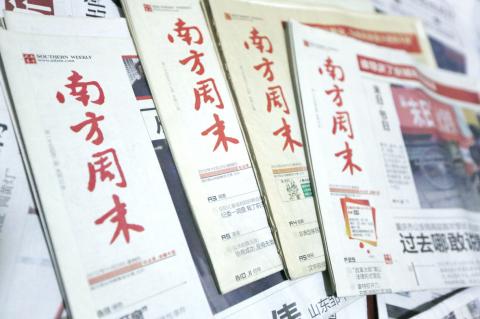|
Rally, online protest
over China censorship spread
FACE OFF: Protesters calling for media freedom
and CCP loyalists waving Chinese flags hurled insults and had a minor scuffle
near the offices of the ¡¥Southern Weekly¡¦
AP, BEIJING

Past issues of Southern Weekly
newspapers are pictured in Beijing, China, yesterday.
Photo: EPA
Free-speech protesters in masks squared
off against flag-waving communist loyalists in a southern Chinese city yesterday
as a dispute over censorship at a newspaper spilled into the broader population,
with authorities shutting microblog accounts of supporters of the paper.
What started out as a conflict between journalists at the Guangzhou-based
Southern Weekly and a top censor over a New Year¡¦s editorial has rapidly become
a focal point driving public calls for the Chinese Communist Party (CCP)
government to loosen its grip on information.
The dispute centers on how the editorial, originally calling for political
reform, was transformed into a tribute praising the CCP. Academics have signed
open letters calling for the censor¡¦s dismissal, celebrities and other
supporters of the journalists are speaking out for the paper on microblogs ¡X
drawing a crackdown by authorities ¡X and hundreds of people gathered for a
second day outside the publication¡¦s office bearing flowers and signs in
support.
The paper¡¦s editorial committee was in negotiations with its top management,
which is part of the provincial propaganda office, according to a Southern
Weekly editor. The editor spoke on condition of anonymity because of an internal
directive not to talk to the foreign media.
Propaganda officials want the newspaper to publish ¡X as usual ¡X tomorrow, but
editors are negotiating over whether to do so, and the terms under which they
would be willing, for example, if they could include a letter to readers
explaining the incident, the editor said. The committee is also pushing a larger
appeal to abolish censorship of the newspaper¡¦s content prior to publication,
the editor said. The suggestion is that CCP leaders could provide direction, but
not interfere with reporting and editing, and should refrain from taking issue
with content until after publication, the editor said.
Free-speech protesters started gathering outside Southern Weekly¡¦s offices again
yesterday morning, holding signs calling for media freedom and other democratic
reforms, but were soon confronted by party loyalists waving Chinese flags.
Both sides berated each other ¡X at times resorting to hurling abuse and calling
each other ¡§traitors and running dogs,¡¨ and minor scuffling ensued that was
broken up by police.
¡§Southern Weekly is the only mainland newspaper that, relatively speaking, is
more able to report the truth,¡¨ said one of the protesters, Cheng Qiubo. ¡§We are
very angry that it has been censored ... so we hope that this country can have
media freedom, to abolish the news censorship system.¡¨
The issue also galvanized a wide variety of people on China¡¦s popular microblogs,
with many journalists, academics, entrepreneurs and celebrities posting messages
of support for the newspaper¡¦s stance.
¡§One word of truth outweighs the whole world,¡¨ Chinese actress Yao Chen («À±á)
quoted the Russian Nobel Prize Literature winner Alexander Solzhenitsyn in a
post that was accompanied by the newspaper¡¦s logo.
The paper¡¦s name in Chinese translates literally to ¡§Southern Weekend,¡¨ and in a
sign of the authorities¡¦ sensitivity about the dispute, searches on microblogs
were blocked for that name and even for the otherwise mundane individual Chinese
phrases ¡§southern¡¨ and ¡§weekend.¡¨
At least 15 journalists at the newspaper have not been able to post messages on
Sina Weibo, a popular microblog site that has served as a key platform for
dissenting voices and for spreading information on sensitive incidents. The
journalists have declined comment.
The online ax has fallen on sympathizers, too. Wu Wei (§d°¶), a Guangzhou-based
based writer who posted photographs from Monday¡¦s protest said his Sina Weibo
account was deleted Monday afternoon. Two guards dispatched by the local police
were posted to his residence to prevent him from going out, said Wu, better
known by his pen name, Ye Du (³¥´ç).
|
![]()
![]()
![]()